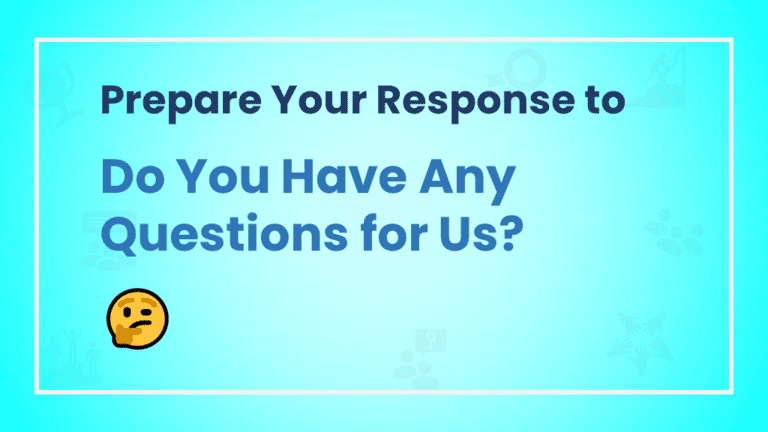Time management is a crucial skill in today's fast-paced world. It's no wonder that employers often ask job candidates about their time management abilities during interviews. 🕑 But fear not! With the right approach, you can answer the “How do you handle time management?” question with confidence and land that dream job. In this article, we'll share tips and strategies to help you shine during your interview. 🌟

Steps to Prepare Your Answer
1. ⏰ Understand the Question:
Before diving into your answer, make sure you fully grasp the question. Interviewers want to know how you prioritize tasks, set goals, and manage your time effectively. Take a moment to reflect on your time management style. 🤔
2. 📝 Prepare Real-Life Examples:
To demonstrate your time management prowess, have a few concrete examples ready. Describe situations where you successfully juggled multiple tasks, met deadlines, or improved your productivity. These stories will make your response more convincing. 📚
3. 🗓️ Emphasize Planning:
Highlight the importance of planning in your time management strategy. Discuss how you create to-do lists, set goals, and use calendars or apps to organize your tasks. Show that you have a structured approach to managing your time. 📅
4. 🎯 Prioritize Effectively:
Explain your method for prioritizing tasks. Mention how you identify urgent and important assignments and tackle them first. Discuss your ability to delegate less critical tasks when necessary. This demonstrates your ability to make smart decisions. 🤓
5. 🧘 Stay Organized:
Share your techniques for staying organized. Whether it's keeping a tidy workspace or using digital tools to track projects, your organizational skills play a vital role in efficient time management. 🧹
6. 🤝 Collaboration and Communication:
Acknowledge the importance of communication and collaboration. Explain how you coordinate with team members or colleagues to ensure everyone is on the same page. Effective teamwork can lead to better time management for the entire group. 🤗
7. ⚡ Adaptability:
Mention your ability to adapt to unexpected changes or disruptions. In a dynamic work environment, things don't always go as planned. Your flexibility and quick thinking can save the day. 💪
8. 📉 Learn from Mistakes:
Don't shy away from discussing past time management challenges. Share how you learned from your mistakes and implemented improvements. This shows self-awareness and a commitment to continuous growth. 📈
9. 💡 Highlight Achievements:
If you have any significant accomplishments related to time management, mention them. For example, if you completed a project ahead of schedule or increased efficiency in a previous role, use these achievements to your advantage. 🏆
5 Sample Answers To “How Do You Handle Time Management?”
Here are five sample answers to the interview question, “How do you handle time management?”
1. Structured Approach:
“I believe effective time management begins with careful planning. I start my day by creating a to-do list, and prioritizing tasks based on their urgency and importance. I also use digital tools and calendars to keep track of deadlines and meetings. This structured approach allows me to stay on top of my responsibilities and ensure that I meet all deadlines.”
2. Adaptability and Flexibility:
“Time management for me is not just about following a rigid schedule but also being adaptable. I understand that unexpected situations can arise. When they do, I remain flexible, rearrange my priorities as needed, and communicate with my team to ensure we can adjust our plans accordingly while still meeting our goals.”
3. Collaborative Time Management:
“I see time management as a team effort. In my previous role, I actively communicated with team members to understand their workloads and deadlines. By coordinating effectively, we were able to delegate tasks efficiently and ensure everyone's responsibilities aligned with our project's timeline. This collaborative approach greatly improved our overall productivity.”
4. Learning from Experience:
“Over the years, I've honed my time management skills by learning from my mistakes. In a past role, I struggled to meet a critical deadline due to poor planning. I took that experience as a lesson and implemented new strategies, such as breaking larger tasks into smaller steps and setting regular check-ins to monitor progress. These adjustments significantly improved my time management abilities.”
5. Proven Achievements:
“I take pride in my ability to not only manage my time effectively but also to achieve results. In my last position, I completed a major project ahead of schedule by implementing time-saving strategies and optimizing processes. This not only demonstrated my time management skills but also positively impacted the company's bottom line.”
Remember to tailor your response to your specific experiences and the job you're interviewing for. These sample answers can serve as a foundation, but personalizing your response will make it more impactful and authentic.
Sample Answers for 5 Different Job Scenarios
Here are sample answers for the “How do you handle time management?” question in five different job scenarios:
1. Project Manager:
“As a Project Manager, effective time management is at the core of my role. I begin by meticulously planning project timelines, breaking down tasks, and assigning responsibilities to team members. I'm a firm believer in using project management software to track progress in real-time. Regular status meetings and clear communication ensure that everyone is aligned with our project's timeline. Additionally, I always have contingency plans ready for unexpected issues, allowing us to stay on track even when challenges arise.”
2. Sales Representative:
“In sales, time management is critical to meet sales targets. I start my day by prioritizing leads and opportunities, focusing on those with the most potential. I also schedule my client meetings and follow-ups strategically to maximize my productivity. Utilizing customer relationship management (CRM) software helps me stay organized and never miss a crucial follow-up. My ability to manage my time efficiently has consistently led to meeting and exceeding sales goals.”
3. Software Developer:
“As a Software Developer, I often work on complex projects with tight deadlines. To manage my time effectively, I adopt agile methodologies. I break down coding tasks into manageable chunks, set daily goals, and use tools like Kanban boards to visualize progress. Regular stand-up meetings with my team keep us aligned and help us identify and resolve any blockers promptly. My approach allows me to meet project milestones while maintaining code quality.”
4. Registered Nurse:
“In the healthcare field, time management is essential for providing quality patient care. I prioritize tasks based on patient needs, focusing on critical cases first. I maintain a detailed shift schedule, allowing me to allocate time efficiently between patient assessments, medication administration, and documentation. Effective communication with colleagues ensures seamless handovers and continuity of care. My ability to manage time well ensures that I can provide the best care to my patients.”
5. Marketing Coordinator:
“As a Marketing Coordinator, I'm responsible for handling multiple campaigns and initiatives simultaneously. I start by setting clear campaign timelines and deadlines. Utilizing project management software, I track the progress of each campaign and adjust strategies as needed. Regular check-ins with the marketing team ensure everyone is on track and any roadblocks are addressed promptly. My organized approach to time management has contributed to successful campaign launches and strong marketing results.”
Tailoring your response to the specific job you're applying for demonstrates your understanding of the role's requirements and how your time management skills align with them.
Conclusion:
When asked, “How do you handle time management?” in an interview, seize the opportunity to showcase your skills and qualities as a candidate. Use real-life examples, emphasize planning and organization, and demonstrate your adaptability and ability to learn from experiences. With the right approach, you'll leave a lasting impression on your interviewer and increase your chances of landing that job! 🌟🎉





